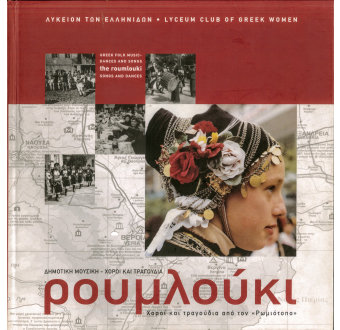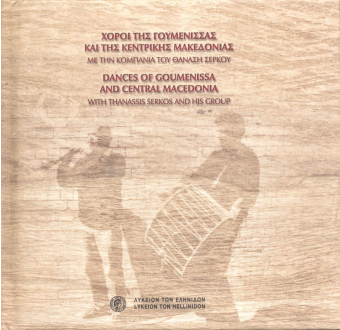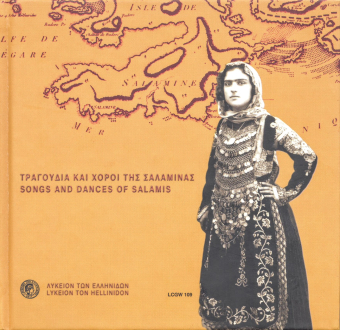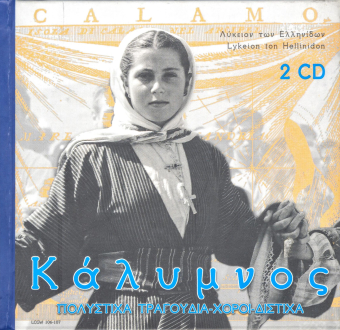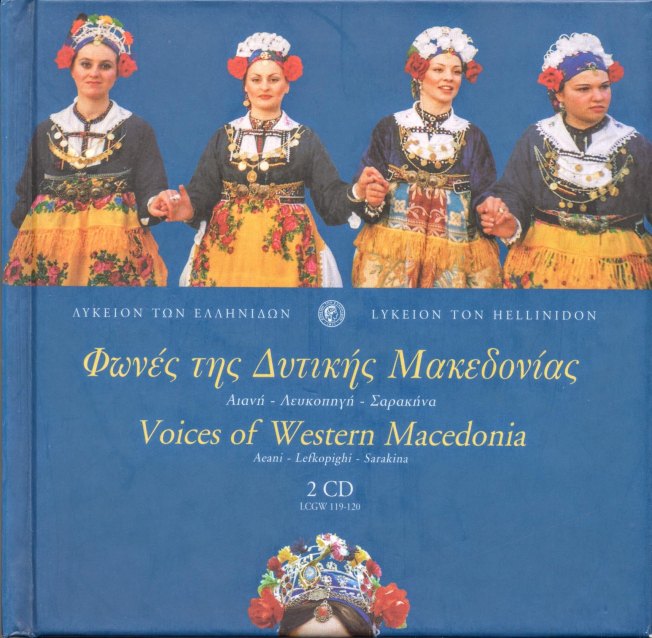
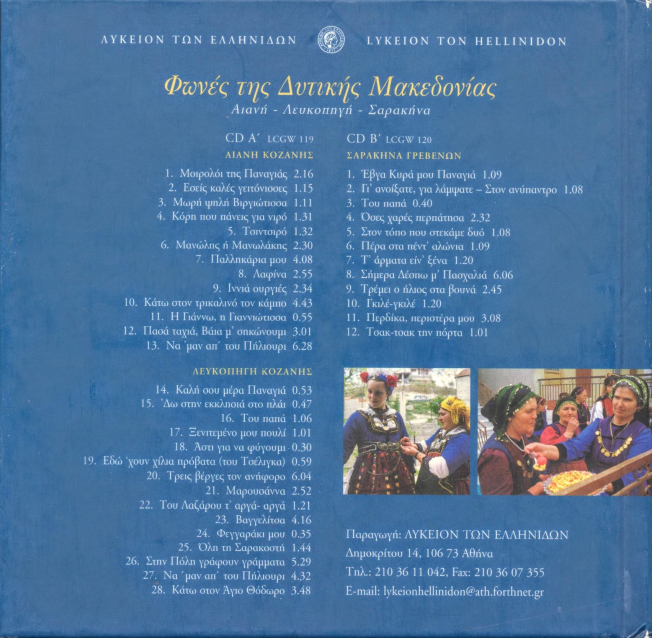
AEANI, KOZANI
Aeani (pop. 2,070 in the 2001 census) is one of the most interesting market towns of the Prefecture of Kozani.
[...]
The customs connected to the feast of Lazarus, which are followed in all the wider Kozani area, constitute a group ritual acted out by girls based on dance and song. They also function as social and religious events, although their relation with the religious feast is more or less symbolic.
In the Charchabás villages, such as Aeani, especially in older days, preparations for the customs of the three-day festivities that took place started very early, with the formation on the eve and day of Lazarus and on Palm Sunday of the groups of Lazarines, who would make their formal appearance before the community, performing the rituals that invoke blessing and ward off evil, and taking part in the final formal circle dance, in which all the groups join.
Each group, composed of 10 to 14 girls of approximately the same age, will start its preparations at the konak, that is at the home of one of its members. There the girls -especially those of marrying age- will be instructed by the older and more experienced women in the songs and dances of the ritual, as well as in the proper comportment, in the social hierarchy and in the knowledge necessary to their smooth integration into the social life of the community.
[...]
The songs that are heard in this theatrical performance are love songs, laudatory songs, and, above all, spring songs, devoid of any religiousness. The young voices are clear, the lyrics are simple, the tunes are straightforward and unadorned by any of the unnecessary and elaborate melodic ornaments cherished by folk musicians. Plain, too, are the kinetic motifs of the dances, austere and spare, without improved flourishes. There is not much variety in the dance patterns, but the girls bear themselves proudly and the performance of the groups is impressive in its simplicity.
After the “great dance”, in which all the performers take part, each group returns to its own konak, where the festivities go on, without the formality and obligations imposed by the official public appearance before the community. On the following day, Palm Sunday, the Lazarines will once again take part in the “great dance”, in which all the women of the village participate. However, this time, it is not they who will play the principal role, but the older, more mature women. The “great dance”, which ends with everyone exchanging wishes for a Happy Easter, marks the close of the three-day festivities and the beginning of Holy Week.
The triumphal religious celebration of Easter in the villages of Kozani and Grevena, when Nature is at her most glorious, will once again afford the opportunity for women’s voices to be raised in song, without instrumental accompaniment. In songs that speak of life and death, of legends and community values. [...]
LEFKOPIGHI, KOZANI
To the southwest of Kozani, and at a distance of only ten kilometres from Aeani, lies Lefkopighi, a large village of approximately 1300 inhabitants (2001 census). It belongs to the same group as the Charchabás villages. Its older name was Velisti, a name we encounter for the first time in a Codex of the Zambordas monastery, dated 1534.
The village kept its name until 1927, when it was renamed Asproneri (White Water). However, the name did not please the inhabitants, so, in 1928, it was rechristened Lefkopighi (White Spring), a name it has retained to this day.
The traditional occupation of the inhabitants was farming and animal husbandry. Today the village is urbanized and most of the inhabitants are employed in the factories of Ptolemais producing electrical energy. The 1995 earthquake seriously affected the character of the village, especially as regards its architecture, since the damage suffered by the houses was so great that they had to be rebuilt, and this was done in modern style.
In spite of the modernization of the place and of its people, the inhabitants of Lefkopighi still retain certain forms of traditional life, the attractive traditional costumes of the women, for instance, which resemble those of the other Charchabás villages. They also preserve some of the old customs, such as the communal board, prepared on the 7th of January (St. John’s Day), by the newlywed women especially, and the communal fete that follows it. The “Fanoi” (Lanterns) of Carnival time is another of the customs preserved in Lefkopighi, as are the customs of spring (of Lazarus, Palm Sunday, Easter and May Day), which the women of the village zealously observe.
In contrast to the younger generation, the older women who have known these rituals in older days, who have taken part in them, are the keenest to preserve and carry them on, to maintain and keep alive the beliefs, the myths and legends -possibly picturesque relics today- on which, in times of hardship and peril, the entire community based its existence and managed to survive.
SARAKINA, GREVENA
Sarakina is a large village situated on the southwestern side of the Prefecture of Grevená. It was rebuilt by the inhabitants after the destructive earthquake of 1995.
In older years, before the development of communications, the region was fairly isolated. The Aliakmon River on one side and Mt.Bourino on the other did not allow much contact with the “outer world”, as a result of which a great many forms of popular culture -customs, dances, songs, some of them very old- were preserved unaltered.
Today the ancestral customs, especially those related to the spring season (Lazari, Easter, May Day) are faithfully observed by the women of the village. Either collectively, under the auspices of the local Cultural Society, or individually, the women of Sarakina sing and dance the old songs in their village and elsewhere, keeping alive the ancient traditions of their region and making them known further afield.
It was the customs related to Lazarus’ Day that were most anxiously awaited, especially by the young, unwed girls, since theirs was the leading role on this occasion.
Next came the Easter customs, in which again the women played the principal role, the men hardly participating or merely joining in certain games on the first or second day of Easter week. The songs the women sing are presented below.
Athens, October 2005
Lefteris Drandakis
CD A' LCGW 119
AEANI, KOZANI
1. Lament of the Virgin 2.16
2. Eseiw kalés geitónisses 1.15
3. Mori psili Virgiotissa 1.11
4. Kori pou panis gia niró 1.31
5. Tsintsiró 1.32
6. Manolis or Manolakis 2.30
7. Pallikaria mou 4.08
8. Lafina 2.55
9. Ighniá ouriés 2.34
10. Kato ston Trikalinó ton kambo 4.43
11. I Yianno, i Yianniotissa 0.55
12. Passa takhia, Vayia m' sikonoumi 3.01
13. Na 'man ap' tou Peliouri 6.28
LEFKOPIGHI, KOZANI
14. Kali sou mera, Panaghia 0.53
15. 'Do stin ekklisia sto plai 0.47
16. Tou papa 1.96
17. Ksenitemeno mou pouli 1.01
18. Asti gia na fygoume 0.30
19. Edo ekhoun khilia provata 0.59
20. Tris verghes ton aniforo 6.04
21. Maroussana 2.52
22.Tou Lazarou t' argá-argá 1.21
23. Evangelitsa 4.16
24. Fengaraki mou 0.35
25. Oli ti Sarakosti 1.44
26. Stin Poli graphoun grammata 5.29
27. Na 'man ap' tou Peliouri 4.32
28. kato ston Aghio Thodoro 3.48
CD B' LCGW 120
SARAKINA, GREVENA
1. Evgha, Kyrá mou Panaghiá 1.09
2. Yia anixete, yia lampsate 1.08
3. Tou papa 0.40
4. Osses kharés perpatisa 2.32
5. Ston topo pou stakame dyo 1.08
6. Péra sta pende alonia 1.09
7. T' ármata ine ksena 1.20
8. Simera Despo m' Paschaliá 6.06
9. O helios tremi sta vouná 2.45
10. Ghilé-ghilé 1.20
11. Perdika, peristera mou 3.08
12. Tsak-tsak tin porta 1.01
Aeani Kozani: Recording April 14th 1982. Older voices: Stella Gourdjoumi, Panagiota Kakaveli, Anastasia Peleka, Vayia Yiannakopoulou, Eleni Yiannakopoulou. Newer voices: Sophia Tzianabeti, Theodora Yiannaki, Stephania Gourtzoumi, Eleni Tzellou, Athanasia Gouna.
Lefkopighi Kozani: Recording 1996. Voices: Group of women from Lefkopighi, members of the "Megas Alexandros" Cultural and Athletic Association.
Sarakina Grevena: Recording 19 January 1999. Voices: Group of women of Sarakina, Grevena. Members of the Cultural Society of Sarakina.
Recorded by: Giannis Sygletos
Sound technical support: Stavros Stavropoulos, Hara Deliyanni




